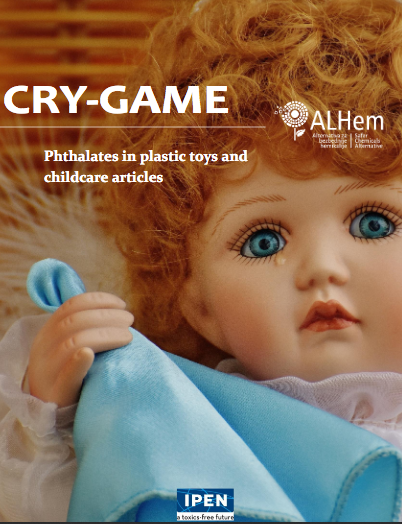Cry Game: Phthalates in Plastic Toys and Childcare Articles
Safer Chemicals Alternative (ALHem) conducted analysis of the presence of banned or restricted phthalates in toys and childcare articles with the aim of raising public awareness on toy health safety in Serbia. The study is a part of a “CRY-GAME” outreach campaign supported by IPEN's Programme on Chemicals in Products “Raising Awareness on Health Impact of the Chemicals Used in Children Toys and Childcare products.”
The current study is part of ALHem’s activities focused on monitoring hazardous chemicals in consumer products available on the market in the Republic of Serbia, with the aim to provide input to the implementation of the national legislation governing consumer safety for hazardous chemicals in products.
The goal of the campaign is to focus public attention on toxic chemicals in plastic toys, with a particular emphasis on phthalates, and their threat to the health of children due to their typical mouth to hands behaviour and regular contact with such toys. We highlight the importance of reading information on the product labels to ensure compliance with the national regulations and consumers’ right to chose products which are safe for human health.
This study asked whether phthalates restricted by the national legislation in Serbia could be found in children’s toys and childcare articles in concentrations that violate the law. Products for testing were purchased in stores selling goods from Asian countries and in specialized toys stores in Serbia. Laboratory analysis were carried out in November 2018 - January 2019.
Although there is a regulation in place that bans or restricts certain phthalates in toys, it is not properly enforced. According to the Serbian Rulebook on restrictions and bans of production, placement on the market and use of chemicals, six classified phthalates are restricted in all toys and childcare articles with the limit of 0.1% by weight, including Di-(2-ethylhexyl) phthalates – DEHP. However, despite sanitary control of imported toys at the border, chemically unsafe toys are still broadly available on the market. Our study found DEHP in 46.6 % of toys and baby care product samples tested with concentrations ranging from 0.5 to 31.5%.
In addition, analysis of information available on product labels showed that only 30% of toy samples met the requirements of the new draft Law on Consumer Goods. These products were purchased in specialised stores selling toys of well-known producers with registered trademarks.
Although all toys tested in the frame of the project contained CE mark on their labels or packages, more than 50% of samples contained high levels of phthalates, which violated the EU regulations and the national legislation of Serbia. Placing the CE mark on the product should guarantee that a product meets conformance requirements specified in EU standards and legislation. However, our project confirmed that the CE mark on the products purchased in Serbia does not guarantee product safety for consumers which jeopardise consumers’ right to know and access to information they need to make the right choice.
Product manufacturers, importers, distributors and traders, as well as competent authorities are fully responsible for the safety of children’s products that are put on the market in Serbia. They should work in close collaboration with other stakeholders, including scientific institutions, health and environmental networks, networks of Institutes for Public Health in Serbia, consumers’ associations and other civil society organisations. Such collaboration will help to ensure product safety and public right to know about chemicals in products for children.
While the Republic of Serbia should fully harmonise its toy safety regulations with the EU Toy Safety Directive, the enforcement of the national regulations is nor less important to ensure toys sold in Serbia are safe for children.
We call upon all companies involved in toys manufacturing and trade in Serbia to comply with the national product safety requirements. We call upon the Ministry of Health to speed up the approval of the legal framework that is in compliance with EU Toys Safety Directive (2009/48/EC),to intensify the enforcement, adopt and implement monitoring programme, which would contribute to the protection of the health of our children and all people in Serbia.
To see a media visibility report for ALHem's Cry Game campaign, click here.
To see a sample of news articles covering the Cry Game campaign, click here.
This project relates to Sustainable Development Goals numbers 3 & 12.
Special thanks to IPEN's Central & Eastern Europe Regional Coordinator Jan Samanek and Regional Hub Arnika for their important contributions to the development and finalization of the project.

